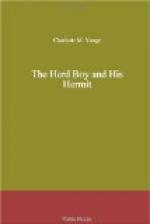‘No treason, Lord Musgrave!’ said the Prioress, laughing.
‘Ah, madam,’ responded Sir Giles, ‘what is treason?’
‘Whatever is against him that has the best of it,’ observed Master Lorimer. ’Well that it is not the business of a poor dealer in horse-gear and leather-work. He asks not which way his bridles are to turn! How now, Tray and Blackchaps? Never growl and gird. You have no part in the fray!’
For they were chained, and could only champ, bark and howl, while Florimond and Watch turned one another over, and had to be pulled forcibly back, by Hal on the one hand and on the other by the Mother Agnes, who would let nobody touch Florimond except herself. After this, the two dogs subsided into armed neutrality, and gradually became devoted friends.
The curiously composed cavalcade moved on their way southward. The Prioress was mounted on the fine chestnut horse that Sir Giles had rescued. She was attended by a nun, Sister Mabel, and a lay Sister, both as hardy as herself, and riding sturdy mountain ponies; but her chaplain, a thin delicate-looking man with a bad cough, only ventured upon a sturdy ass; Anne St. John had a pretty little white palfrey and two men-at-arms. There were two grooms, countrymen, who had run away on the onset of the thieves, but came sneaking back again, to be soundly rated by the Prioress, who threatened to send them home again or have them well scourged, but finally laughed and forgave them.
The merchant, Master Lorimer—who dealt primarily in all sorts of horse furniture, but added thereto leather-work for knights and men-at-arms, and all that did not too closely touch the armourer’s trade— had three sturdy attendants, having lost one in an attack by the Scottish Borderers, and he had four huge Flemish horses, who sped along the better for their loads having been lightened by sales in Edinburgh, where he had hardly obtained skins enough to make up for the weight. His headquarters, he said, were at Barnet, since tanning and leather-dressing, necessary to his work, though a separate guild, literally stank in the nostrils of the citizens of London.
To these were added Sir Giles Musgrave’s twenty archers, making a very fair troop, wherewith to proceed, and the Prioress decided on not going to York. She was not particularly anxious for an interview with the Abbess of her Order, and it would have considerably lengthened the journey, which both Musgrave and Lorimer were anxious to make as short as possible. They preferred likewise to keep to the country, that was still chiefly open and wild, with all its destiny in manufactories yet to come, though there were occasionally such towns, villages and convents on the way where provisions and lodging could be obtained.




